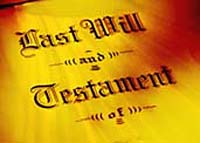
A trend by banks to not install safe deposit boxes in new branches being constructed could solve some problems for those handling estates.
In the past, bank customers often used safe deposit boxes to protect important documents – but today it is estimated only 5% of customers have continued the practice.
A recent blog by a South Coast Today writer somewhat laments the decline of safe deposit boxes. The article is entitled “Of What Use is a Safe Deposit Box?“.
The writer recalls how she used to go to the bank with her mother before every family vacation to open the family’s safe deposit box. There the author’s mother would tell her the story of each piece of jewelry in the box.
While the decline of safe deposit box usages might not necessarily be a great thing for the protection of all personal property, it is good in one sense. When the owner of a safe deposit box passes away, the bank cannot legally allow anyone else to open the box, including someone else whose name is on the box. This is because the box becomes property of the deceased’s estate and only an authorized estate representative can open it.
The problem with this is that many people put their wills in their safe deposit boxes. The will sets out who the executor of the estate is. Ironically, this is the very person who would be considered an authorized representative of the estate.
However if the will is in the box and no unauthorized person can open the box, then how can the executor prove that he or she is authorized or even the actual executor? In the end, this requires going to court and getting an order to open the box.
The decline in safe deposit box usage means it could reduce that problem in handling estates.
Reference: South Coast Today (Jan. 18, 2016) “Of What Use is a Safe Deposit Box?”











